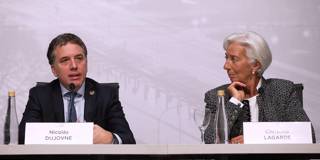In 2013, the International Monetary Fund produced a report acknowledging that it had “underestimated” the effects that austerity would have on Greece’s economy. Yet the Fund has made the same mistakes in its subsequent deals with Argentina and Ecuador.
NEW DELHI – The process of selecting the International Monetary Fund’s next managing director must change. In particular, the tradition of choosing a European for the post – based on an unfair and anachronistic “gentlemen’s agreement” reached with the United States when the institution was established 75 years ago – needs to be discarded. But even more important, the IMF’s longstanding approach to lending should be transformed.
The Fund has a long history of policy mistakes. Yet, as Christine Lagarde’s just-completed tenure showed, it has learned little from them. Consider the case of Argentina. In mid-2018, the IMF agreed to provide the country with a heavily frontloaded three-year loan worth nearly $57 billion – the largest in the institution’s history – following a series of reckless decisions by President Mauricio Macri.
One such decision, made soon after he took office in 2015, was to strike a deal with the holdout creditors who were still fighting in US courts to be repaid in full, following Argentina’s 2002 debt default and subsequent restructuring. Another was Macri’s subsequent borrowing spree, which caused public debt – mostly denominated in dollars – to swell by more than one-third, to $321 billion in 2017.

NEW DELHI – The process of selecting the International Monetary Fund’s next managing director must change. In particular, the tradition of choosing a European for the post – based on an unfair and anachronistic “gentlemen’s agreement” reached with the United States when the institution was established 75 years ago – needs to be discarded. But even more important, the IMF’s longstanding approach to lending should be transformed.
The Fund has a long history of policy mistakes. Yet, as Christine Lagarde’s just-completed tenure showed, it has learned little from them. Consider the case of Argentina. In mid-2018, the IMF agreed to provide the country with a heavily frontloaded three-year loan worth nearly $57 billion – the largest in the institution’s history – following a series of reckless decisions by President Mauricio Macri.
One such decision, made soon after he took office in 2015, was to strike a deal with the holdout creditors who were still fighting in US courts to be repaid in full, following Argentina’s 2002 debt default and subsequent restructuring. Another was Macri’s subsequent borrowing spree, which caused public debt – mostly denominated in dollars – to swell by more than one-third, to $321 billion in 2017.